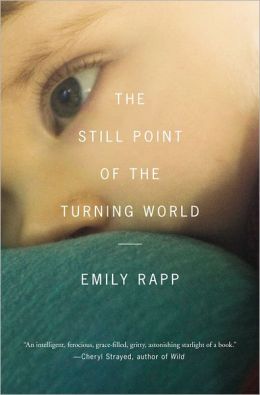 “Like all mothers, Emily Rapp had ambitious plans for her first and only child, Ronan. He would be smart, loyal, physically fearless, and level-headed, but fun. He would be good at crossword puzzles like his father. He would be an avid skier like his mother. Rapp would speak to him in foreign languages and give him the best education.
“Like all mothers, Emily Rapp had ambitious plans for her first and only child, Ronan. He would be smart, loyal, physically fearless, and level-headed, but fun. He would be good at crossword puzzles like his father. He would be an avid skier like his mother. Rapp would speak to him in foreign languages and give him the best education.
But all of these plans changed when Ronan was diagnosed at nine months old with Tay-Sachs disease, a rare and always-fatal degenerative disorder. Ronan was not expected to live beyond the age of three; he would be permanently stalled at a developmental level of six months. Rapp and her husband were forced to re-evaluate everything they thought they knew about parenting. They would have to learn to live with their child in the moment; to find happiness in the midst of sorrow; to parent without a future.
The Still Point of the Turning World is the story of a mother’s journey through grief and beyond it. Rapp’s response to her son’s diagnosis was a belief that she needed to “make my world big”—to make sense of her family’s situation through art, literature, philosophy, theology and myth. Drawing on a broad range of thinkers and writers, from C.S. Lewis to Sylvia Plath, Hegel to Mary Shelley’s Frankenstein, Rapp learns what wisdom there is to be gained from parenting a terminally ill child. In luminous, exquisitely moving prose she re-examines our most fundamental assumptions about what it means to be a good parent, to be a success, and to live a meaningful life.”
If you’ve already read The Still Point of the Turning World, try one of these memoirs:
 Her: A Memoir by Christa Parravani
Her: A Memoir by Christa Parravani
“Christa Parravani and her identical twin, Cara, were linked by a bond that went beyond siblinghood, beyond sisterhood, beyond friendship. Raised up from poverty by a determined single mother, the gifted and beautiful twins were able to create a private haven of splendor and merriment between themselves and then earn their way to a prestigious college and to careers as artists (a photographer and a writer, respectively) and to young marriages. But, haunted by childhood experiences with father figures and further damaged by being raped as a young adult, Cara veered off the path to robust work and life and in to depression, drugs and a shocking early death.A few years after Cara was gone, Christa read that when an identical twin dies, regardless of the cause, 50 percent of the time the surviving twin dies within two years; and this shocking statistic rang true to her. “Flip a coin,” she thought,” those were my chances of survival.” First, Christa fought to stop her sister’s downward spiral; suddenly, she was struggling to keep herself alive.”
 Wave by Sonali Deraniyagala
Wave by Sonali Deraniyagala
“On the morning of December 26, 2004, on the southern coast of Sri Lanka, Sonali Deraniyagala lost her parents, her husband, and her two young sons in the tsunami she miraculously survived. In this brave and searingly frank memoir, she describes those first horrifying moments and her long journey since. She has written an engrossing, unsentimental, beautifully poised account: as she struggles through the first months following the tragedy, furiously clenched against a reality that she cannot face and cannot deny; and then, over the ensuing years, as she emerges reluctantly, slowly allowing her memory to take her back through the rich and joyous life she’s mourning, from her family’s home in London, to the birth of her children, to the year she met her English husband at Cambridge, to her childhood in Colombo; all the while learning the difficult balance between the almost unbearable reminders of her loss and the need to keep her family, somehow, still alive within her.”
